|
|
|
Sort Order |
|
|
|
Items / Page
|
|
|
|
|
|
|
| Srl | Item |
| 1 |
ID:
086457
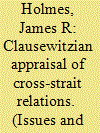

|
|
|
|
|
| Publication |
2008.
|
| Summary/Abstract |
This article uses the strategic theory of Carl von Clausewitz to analyze how the 2008 elections in Taiwan and the United States may influence cross-Strait relations. The elections will affect governments, citizens, and armed forces, and thus the value Taiwan and the United States attach to preserving the island's de facto independence from the mainland. Surveying likely interactions across the Taiwan Strait, it is hard to avoid the conclusion that the China-Taiwan-U.S. strategic triangle includes one power, China, whose Clausewitzian "trinity" remains uniformly locked on eventual unification with Taiwan and whose patience is finite; a second, Taiwan, whose government and people are ambivalent and whose military preparations are lagging; and a third, the United States, whose government and people have priorities that do not include a clash with China, whose military is shrinking, and whose officer corps wants to avoid fighting in the Strait. This mismatch in political commitments and capabilities suggests that, far from bringing about an enduring rapprochement, the elections have done little to dispel potential conflict in East Asia.
|
|
|
|
|
|
|
|
|
|
|
|
|
|
|
|
| 2 |
ID:
128553
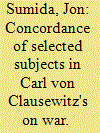

|
|
|
|
|
| Publication |
2014.
|
| Summary/Abstract |
This concordance of the standard English translation of Carl von Clausewitz's On War by Michael Howard and Peter Paret breaks new ground in two important respects. First, it indexes the text in unprecedented detail by listing references to every significant proposition and distinctive phrase under major subject headings. Second, information about the location of indexed items includes the book and chapter of On War, and page numbers in both current editions of the standard translation.
|
|
|
|
|
|
|
|
|
|
|
|
|
|
|
|
| 3 |
ID:
186088
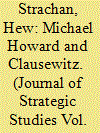

|
|
|
|
|
| Summary/Abstract |
The English translation of Carl von Clausewitz’s On War by Michael Howard and Peter Paret has had a major impact on how Clausewitz is read today, especially in the United States and Britain. Howard in particular was determined to make Clausewitz doubly relevant – as one soldier speaking to other soldiers and as an author whose views on war had continuing purchase. However, the result is a text which, in reflecting the issues of its day, is not fully reflective of what Clausewitz himself said and has itself become dated.
|
|
|
|
|
|
|
|
|
|
|
|
|
|
|
|
| 4 |
ID:
132360
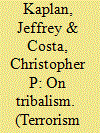

|
|
|
|
|
| Publication |
2014.
|
| Summary/Abstract |
In this article, we endeavor to shed new light on the consequences of tribalism in the present day, one of the most important of which is the threat posed by lone wolf actors and the emergence of autonomous cells that operate with no central direction. To better acquaint the reader with the theoretical models used in this article-in particular the Trinitarian model of Carl von Clausewitz-we begin with historic models dating back to Alexander the Great. The central focus of our article posits a reconceptualization of tribalism as a driving force behind the global jihadist phenomenon. We will go into the cases of Iraq and Afghanistan in some depth, believing that it is necessary to provide a close examination of these case studies to better understand the emergence of jihadist lone wolves who operate both in the ungoverned spaces of the Middle East and South Asia and in their Western homelands. We conclude with an examination of cases of jihadist lone wolf terrorism involving recent converts to radical Islam in the U.S. Finally, our article focuses on the emerging security threats posed by lone wolves, autonomous cells, and the challenges ahead for the military, security, and intelligence services.
|
|
|
|
|
|
|
|
|
|
|
|
|
|
|
|
| 5 |
ID:
138440


|
|
|
|
|
| Summary/Abstract |
The instrumental role Marie von Clausewitz played in the life of Carl von Clausewitz and the publication of his seminal work On War is often alluded to but seldom studied. The main reason for this is the fact that although Marie saved and shaped Clausewitz’s legacy, few of her own letters were published and the majority assumed lost. In July 2012, the Prussian Privy State Archives in Berlin received a truly sensational find – the full private correspondence between Marie and Carl von Clausewitz. The most valuable among them are 283 never-before published letters from Marie to her husband. They finally allow her influence over the great military theorist and her contribution to his lifework to be studied in depth. Their intellectually intensive correspondence was often echoed in Carl von Clausewitz’s writings. Marie von Clausewitz’s connections and political activism provided her husband with insight and access into the highest circles of power. Finally, by editing and publishing On War she saw his life work fulfilled.
|
|
|
|
|
|
|
|
|
|
|
|
|
|
|
|
| 6 |
ID:
145675
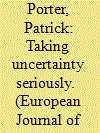

|
|
|
|
|
| Summary/Abstract |
If we can’t reliably predict the future, how can we be wise when preparing for it? Examining the UK’s ‘Strategic Defence and Security Review’ of 2010, I demonstrate that though planners often rightly invoke uncertainty, they also imply a highly certain ideology about Western power and foresight. Modern ‘national security states’ describe the world as dangerously uncertain, yet fall prey to a misplaced confidence in their ability to anticipate and prevent threats. I argue that classical realism, especially that of Clausewitz and Morgenthau, is a valuable resource for handling uncertainty more reflexively. Classical realism counsels that governments should go beyond attempts to improve foresight. They should try to check against the fallibility of their assumptions, marshal their power more conservatively, insure against the likelihood of predictive failure by developing the intellectual capability to react to the unknown, and avoid misplaced confidence in their ability to bring order into chaos.
|
|
|
|
|
|
|
|
|
|
|
|
|
|
|
|
| 7 |
ID:
102663


|
|
|
|
|
| Publication |
2011.
|
| Summary/Abstract |
Carl von Clausewitz might seem an unusual thinker to invoke in the name of wildlife protection but his insights into the nature of war provide a unique perspective into an arena that arguably poses more complex moral questions of responsibility to protect than with humans. The increasingly dangerous world of wildlife conservation offers a prism for examining many issues linked to sovereignty, especially in developing countries. This study highlights how the commercial rewards of the wildlife trade have fed into problems surrounding national security such as corruption, sub-state insurgency and state legality. These factors have led to the growing militarization of wildlife protection and, in turn, raise a fundamental question: is it ever right for an outside actor to ignore international convention to save a species from extinction?
|
|
|
|
|
|
|
|
|
|
|
|
|
|
|
|
|
|
|
|
|